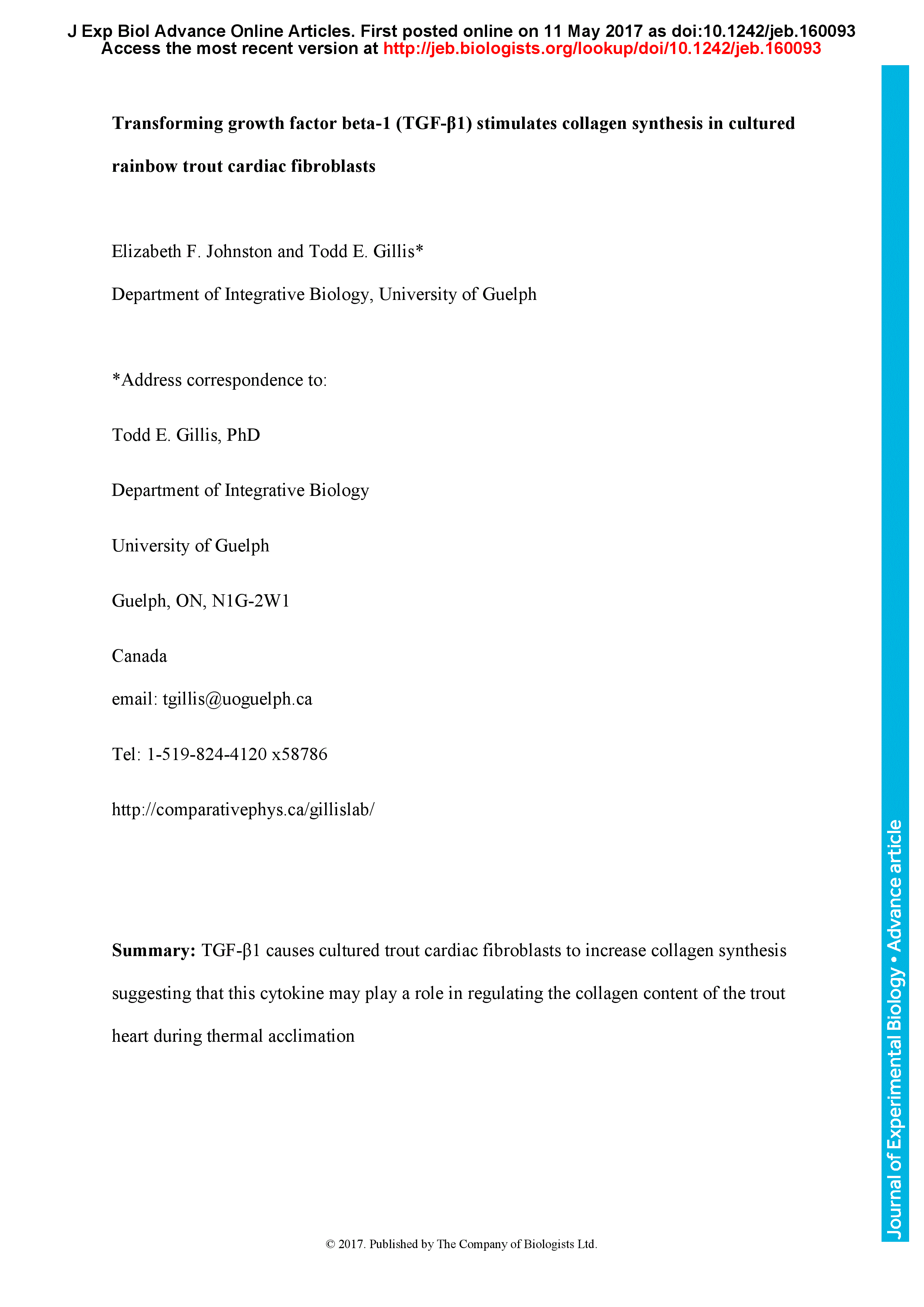Cold acclimation of rainbow trout, Oncorhynchus mykiss, causes collagen to increase within the extracellular matrix (ECM) of the myocardium, while warm acclimation has the opposite effect. The mechanism responsible for this remodeling response is not known. In mammals, transforming growth factor beta-1 (TGF-β1) stimulates collagen deposition within the myocardial ECM. Therefore, we hypothesized that TGF-β1 regulates trout myocardial ECM turnover and predicted that TGF-β1 would induce collagen deposition in cultured rainbow trout cardiac fibroblasts. We found that treatment of trout cardiac fibroblasts with 15 ng · ml−1 human recombinant TGF-β1 caused an increase in total collagen at 48 h and 72 h and an increase in collagen type I protein after 7 d. We also found that TGF-β1 treatment caused an increase in the transcript abundance of tissue inhibitor of metalloproteinase 2 (timp-2) and matrix metalloproteinase 9 (mmp-9) at 24 h. Cells treated with TGF-β1 also had lower levels of the gene transcript for mmp-2 after 48 h and higher levels of the gene transcript for collagen type I α I (col1a1) after 72 h. These changes in gene expression suggest that the increase in collagen deposition is due to a decrease in the activity of matrix metalloproteinases and an increase in collagen synthesis. Together, these results indicate that TGF-β1 is a regulator of ECM composition in cultured trout cardiac fibroblasts and suggests that this cytokine may play a role in regulating collagen content in the trout heart during thermal acclimation.
Transforming growth factor beta-1 (TGF-β1) stimulates collagen synthesis in cultured rainbow trout cardiac fibroblasts
Currently Viewing Accepted Manuscript - Newer Version Available
Elizabeth F. Johnston, Todd E. Gillis; Transforming growth factor beta-1 (TGF-β1) stimulates collagen synthesis in cultured rainbow trout cardiac fibroblasts. J Exp Biol 2017; jeb.160093. doi: https://doi.org/10.1242/jeb.160093
Download citation file:
Advertisement
2023 JEB Outstanding Paper Prize shortlist and winner

The JEB Editors are delighted to announce the shortlisted authors for the 2023 JEB Outstanding Paper Prize. Read the winning paper - Tiny spies: mosquito antennae are sensitive sensors for eavesdropping on frog calls - by Hoover Pantoja-Sanchez and Brian Leavell from Ximena Bernal's lab at Purdue University, USA.
JEB Science Communication Workshop for ECRs

If you’re an early-career researcher interested in science communication and are attending the SEB Annual Conference in Prague this summer, come a day early and join the JEB Editors at a sci comm workshop to learn the key writing skills needed to promote your research to a broad audience beyond your peers (1 July at 14.30-17.30). Places are limited to 24 attendees, and applicants should apply through the SEB registration page by 30 April 2024.
Bridging the gap between controlled conditions and natural habitats in understanding behaviour

Novel technologies enable behavioural experiments with non-model species, in naturalistic habitats and with underexplored behaviours. In their Commentary, Scholz and colleagues discuss how to obtain a deeper understanding of the natural ecology and lifestyle of study animals.
Beluga metabolic measures could help save species

To help save animals from extinction, it’s important to understand what each species needs to survive. This led Jason John et al. to measure the metabolic rates of captive belugas to develop a ‘fish calculator’ showing that the whales need to eat ~23 salmon per day.
ECR Workshop on Positive Peer Review

Are you an ECR looking for tips on how to write concise, astute and useful manuscript reviews? If so, join the JEB Editors at a 2-hour JEB-sponsored Workshop on Positive Peer Review at the Canadian Society of Zoologists annual meeting in Moncton on 9 May 2024 at 13.00-15.00. There are 25 spaces for ECRs and selection is first come, first serve. To sign up, check the ECR Workshop box when you register for the CSZ meeting.



